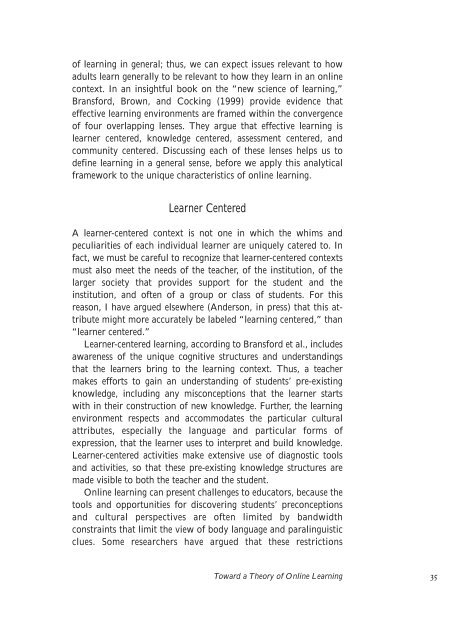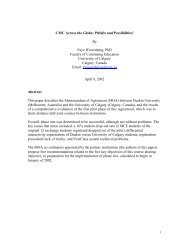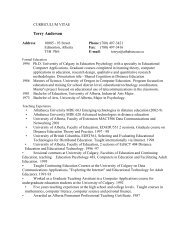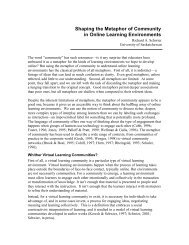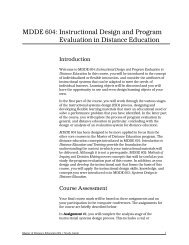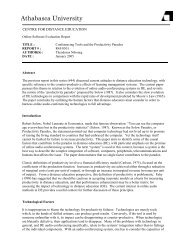Toward a Theory of Online Learning - Centre for Distance Education ...
Toward a Theory of Online Learning - Centre for Distance Education ...
Toward a Theory of Online Learning - Centre for Distance Education ...
You also want an ePaper? Increase the reach of your titles
YUMPU automatically turns print PDFs into web optimized ePapers that Google loves.
<strong>of</strong> learning in general; thus, we can expect issues relevant to howadults learn generally to be relevant to how they learn in an onlinecontext. In an insightful book on the “new science <strong>of</strong> learning,”Brans<strong>for</strong>d, Brown, and Cocking (1999) provide evidence thateffective learning environments are framed within the convergence<strong>of</strong> four overlapping lenses. They argue that effective learning islearner centered, knowledge centered, assessment centered, andcommunity centered. Discussing each <strong>of</strong> these lenses helps us todefine learning in a general sense, be<strong>for</strong>e we apply this analyticalframework to the unique characteristics <strong>of</strong> online learning.Learner CenteredA learner-centered context is not one in which the whims andpeculiarities <strong>of</strong> each individual learner are uniquely catered to. Infact, we must be careful to recognize that learner-centered contextsmust also meet the needs <strong>of</strong> the teacher, <strong>of</strong> the institution, <strong>of</strong> thelarger society that provides support <strong>for</strong> the student and theinstitution, and <strong>of</strong>ten <strong>of</strong> a group or class <strong>of</strong> students. For thisreason, I have argued elsewhere (Anderson, in press) that this attributemight more accurately be labeled “learning centered,” than“learner centered.”Learner-centered learning, according to Brans<strong>for</strong>d et al., includesawareness <strong>of</strong> the unique cognitive structures and understandingsthat the learners bring to the learning context. Thus, a teachermakes ef<strong>for</strong>ts to gain an understanding <strong>of</strong> students’ pre-existingknowledge, including any misconceptions that the learner startswith in their construction <strong>of</strong> new knowledge. Further, the learningenvironment respects and accommodates the particular culturalattributes, especially the language and particular <strong>for</strong>ms <strong>of</strong>expression, that the learner uses to interpret and build knowledge.Learner-centered activities make extensive use <strong>of</strong> diagnostic toolsand activities, so that these pre-existing knowledge structures aremade visible to both the teacher and the student.<strong>Online</strong> learning can present challenges to educators, because thetools and opportunities <strong>for</strong> discovering students’ preconceptionsand cultural perspectives are <strong>of</strong>ten limited by bandwidthconstraints that limit the view <strong>of</strong> body language and paralinguisticclues. Some researchers have argued that these restrictions<strong>Toward</strong> a <strong>Theory</strong> <strong>of</strong> <strong>Online</strong> <strong>Learning</strong>35


